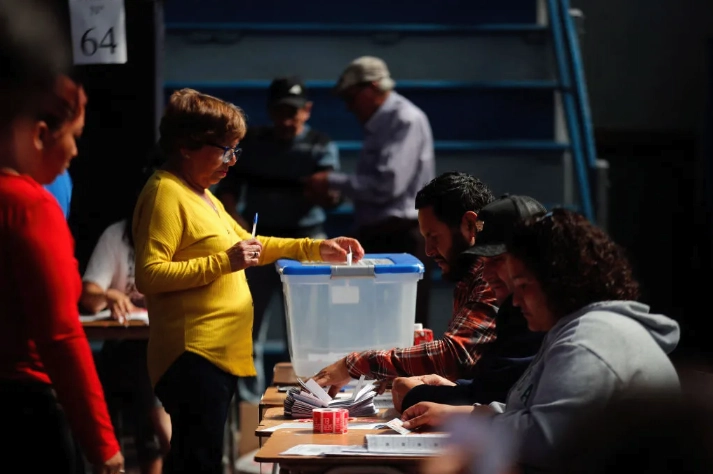On Sunday, December 17, Chile voted on a second constitutional text. Once again the Chilean citizenry rejected the proposal, and we are back to almost the same place in a process that opened in October 2019 in the context of what is known as the Estallido Social (social outburst). Although the failure of Sunday’s text is much less resounding than that of September 2022, when the difference had been 24 points, this Sunday it was 11%. In this brief commentary, I try to answer two questions: who are the winners (so far) of the process? What can happen from now on?
It is clear that the conservative sectors of the country, even though their position was rejected, were the big winners of this process. Readers will surely wonder how I can say that if the government and the center and left conglomerates defended the option “against” the new constitutional text (i.e., at least indirectly, they defended the status quo) and the more conservative sector supported the “for” option, which was defeated. To explain this issue, it is necessary to keep in mind the broader context in which the exit plebiscite took place.
Under the catchy slogan “it’s not 30 pesos, it’s 30 years”, alluding to the 30 pesos increase in the subway fare that culminated in the Estallido, and the 30 years of center-left governments, the social protest was a tremendous collective catharsis. At that time, the various groups that came out to shout their demands in the streets, many times violently, faced the harshness of police repression. The political system, so vilified for its immobility and inability to reach consensus, paradoxically agreed, in November 2019, to unblock the socio-political crisis through a constitutional process in which we are still immersed.
The so-called Peace Agreement consisted of an initial plebiscite where Chileans were asked whether they supported changing the Constitution and if so, who should write the draft: a mixed group of legislators and citizens elected for that purpose, or a fully elected group of people. The Plebiscite resulted in overwhelming support for the process of change led by elected citizens, which was supported by almost 80% of the voters, but was precisely half of the total electorate.
In interpreting this percentage, the Chilean left made a lethal mistake. It believed that it enjoyed a large majority of support, when in reality, 10% voted against the change, and 50% of the Chilean citizenry did not participate in the process, either because they feared the COVID-19 contagion, or because they were afraid of the outburst violence, or because they simply did not want to vote.
The subsequent election of the members of the Constitutional Convention in charge of drafting the new text was marked by the irruption of independents, many of them representing the most radical sectors, most of whom lacked political experience. The result was an identitarian, disjointed, maximalist, and incongruous draft. Once the process was concluded, the so-called Exit Plebiscite of September 2022 was held, in which the citizens had to ratify the proposed text through a mandatory vote. The latter was one of the most contentious aspects of the November agreement, where, as expected, the progressive world defended the obligatory nature of the vote and the conservative sectors were reluctant to include it.
Thus, the text drafted by the Convention instead of the so-called “Pinochet Constitution” brought with it two unprecedented paradoxes. First, given that public opinion polls showed an unstoppable upward trend of rejection very concentrated in the popular sectors (those who usually do not vote), they led the pro-government left to try to demobilize the citizenry and the right, in the opposition, to mobilize it as much as possible, something as counterintuitive as unexpected.
The second paradox was that the process was so messy and entangled that the country reached a situation in which each side of the dispute asked for the citizens’ vote with the promise that they would change in case of winning: “I approve to reform” or “I reject to reform”. To say the least, this is something strange, in the world of popular and direct votes and surely connotes the enormous flaws of the texts discussed.
The result of the “Exit Plebiscite” was a thrashing from any perspective: not only because of the 24 points of difference at the national level but also because it was defeated in 338 of the 346 municipalities of the country, even by more than 60 points of difference in communes of high Mapuche concentration even though the new text was supposedly sensitive to the demands and needs of the native peoples.
After the September failure, the political elite again agreed to start another constituent process, but this time led by the political parties. In December 2022, the Congress decided to create a Commission of Experts made up of 24 members with gender parity and conglomerate (ruling party/opposition). Its objective would be to elaborate a draft proposal based on twelve major principles that achieved consensus among the political parties, on which a Constitutional Council of 50 popularly elected members would work.
What no one anticipated, however, was the resounding success of the newly created Republican Party (PR), a far-right split of the UDI, the conglomerate that until then represented the most conservative sectors. In the election of councilors, the PR obtained 23 of the 50 seats that were added to the 11 of the traditional right. The result of the election meant a Copernican shift in the composition of the body in charge of the final drafting of the constitutional text, which was at the antipodes of the previous Convention.
Faced with these changes, I have not stopped thinking about what Newton would say in this circumstance: “Remember my third law: every action generates a reaction of equal intensity but in the opposite direction”. Just as it happens in physics, so in politics there are moments when Newton’s laws are almost perfect and the conformation of the Council fits like a glove.
The question was what strategy would dominate the actions of the main protagonists in the drafting process. The large sectors of the center, center right and right, did not seem uncomfortable with the current Constitution. And one could imagine that having such a stranglehold on the process, the right could now afford the luxury of molding a draft to their liking… if it was not approved, the Constitution they had defended months before would prevail. It is not surprising, then, that this time the text was radicalized, this time to the right.
The left, on the other hand, had to make a huge accommodation exercise to deal with another great paradox: the so-called “Pinochet Constitution”, which had been defenestrated a few months before, had now to be defended considering that the alternative was worse for its interests. Even discursively, the turn did not go unnoticed: the so-called “Pinochet Constitution” in September 2022 became the “Constitution in force” or the “Lagos Constitution” in December 2023, without changing a single word. I believe that no one in their right mind would have imagined on March 11, 2022, the day President Boric took office, that the government of Chile would find it necessary to defend the “Constitution of Pinochet”.
Sunday’s rejection was clear. However, I am convinced that, had we emulated the logic of the 2020 “entrance plebiscite”, where two questions were asked, but this time, we would have consulted if we wanted a new constitution, and if so, we would have faced the draft of the Council of Experts against the draft of the Constitutional Council, the Experts’ draft would have won by a wide margin.
What will happen from now on? It is difficult to determine. President Boric was explicit that whatever the outcome, the issue would not be dealt with again under his current administration. On the one hand, from the left, some fear that, if the 2023 text is approved, Chile would enter a new cycle of instability, even envisioning a new social outburst. On the other hand, from the right, they argued that the new text would produce stability and the end of “chaos”. On the other hand, a good part of the legislators have supported the idea that with the current quorums (among the lowest in the continent) it is possible to introduce changes to the current text and that this discussion should be carried out by the Congress.
The scenario is still uncertain. However, there is no doubt that the future will depend, to a great extent, on the responsibility, attitudes, and decisions of the country’s political elite. What I believe is clear is that the citizens are somewhat exhausted by a four-year process that in their eyes turned out to be nothing and that most of them consider extremely distant from their concerns and interests.
Today, after four years, we are living a déjà vu in the land of paradoxes.













